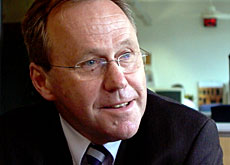Swiss ponder future role of the internet
Swiss website experts have outlined proposals to present to the UN-sponsored Internet Governance Forum (IGF) that will discuss the future shape of the medium.
Some observers fear the forum lacks the teeth to make any meaningful changes or that it will be hijacked by politically motivated groups when it meets for the first time in October.
The concept of an independent international forum to discuss key policy issues relating to the future of the internet was born at the UN World Summit on the Information Society (WSIS) in Tunisia last year.
It followed complaints from several countries that the US exercises an unhealthy control of the Web through an agency set up by the government’s department of commerce, called the Internet Corporation for Assigned Names and Numbers (Icann).
But Swiss diplomat Markus Kummer, IGF’s executive coordinator, told a conference in Zurich that the forum should distance itself from old political arguments.
“IGF’s first meeting should not get lost in procedural debates, repeat WSIS debates or turn into a diplomatic conference,” he said.
He hopes the inaugural meeting in the Greek capital, Athens, will rather be used to thrash out policies on the thorny issues of copyright, security, access to knowledge and the language of the internet.
Gaining access
Another issue likely to be high on the agenda is helping developing countries gain access to the internet with financial and technological assistance.
Friday’s conference at Zurich’s Federal Institute of Technology, called Internet Governance and the Swiss, brought together representatives from the government, academia, commerce and civil rights groups.
However, some of the delegates cast doubts on IGF’s ability to make a difference.
Thomas Schneider from the Federal Office of Communications expressed fears that IGF’s first meeting could get bogged down through a combination of diversity of interests, the sheer number of issues to be tackled in a limited time and sharp differences in expectations.
His sentiments were echoed by Wolf Ludwig from the civil rights watchdog the Swiss Platform for the Information Society.
“I hope that this will not be just another UN forum at which people find it easy to talk but difficult to reach decisions,” he told swissinfo.
“I am not sure the IGF really has the means to exert pressure on governments which is why we have to make the governance of the website a public issue.”
Pressures
Lynn St Amour, president of the Geneva-based Internet Society that represents professional interests, fears the IGF could be rendered useless if it succumbs to inevitable political pressures from various governments.
She pointed out that some countries, including China and Tunisia, have an interest in exercising authoritarian control over certain websites.
“I think the first meeting will be free from political interference, but if the IGF succumbs to such pressure in future it will be the death of it,” she told swissinfo.
But Ludwig sees this as another reason for giving debates over the governance of the internet more publicity.
“There are some governments, such as China and Saudi Arabia, that have very closed ideas about the internet and even see it as a threat,” he said.
“Commercial groups just see the internet as a market place,” he added. “This is why the public interest should be on the table at forums such as the IGF.”
swissinfo, Matthew Allen in Zurich
The inaugural meeting of the Internet Governance Forum will take place in Athens from October 30 to November 2.
It will discuss a range of issues on the broad themes of openness, security, diversity and access but has no power to make decisions on the future governance of the internet.
The IGF will continue to stage annual meetings of three to five days duration.
Since 1998 the management of all internet addresses on the website has been controlled by the Internet Corporation for Assigned Names and Numbers (Icann). It was set up by the US government department of commerce that still exercises significant control over the body.
After failing to persuade the US to relinquish direct control of internet addresses, a compromise solution was found at the UN World Summit on Information Society held in Tunis last year.
The summit set up the Internet Governance Forum (IGF) with the mandate to bring together a wide range of internet stakeholders from governments organisations, private, academic and public bodies to discuss policy issues.
According to the summit resolution: “The working and function of the Forum will be multilateral, multi-stakeholder democratic and transparent.”

In compliance with the JTI standards
More: SWI swissinfo.ch certified by the Journalism Trust Initiative



You can find an overview of ongoing debates with our journalists here . Please join us!
If you want to start a conversation about a topic raised in this article or want to report factual errors, email us at english@swissinfo.ch.